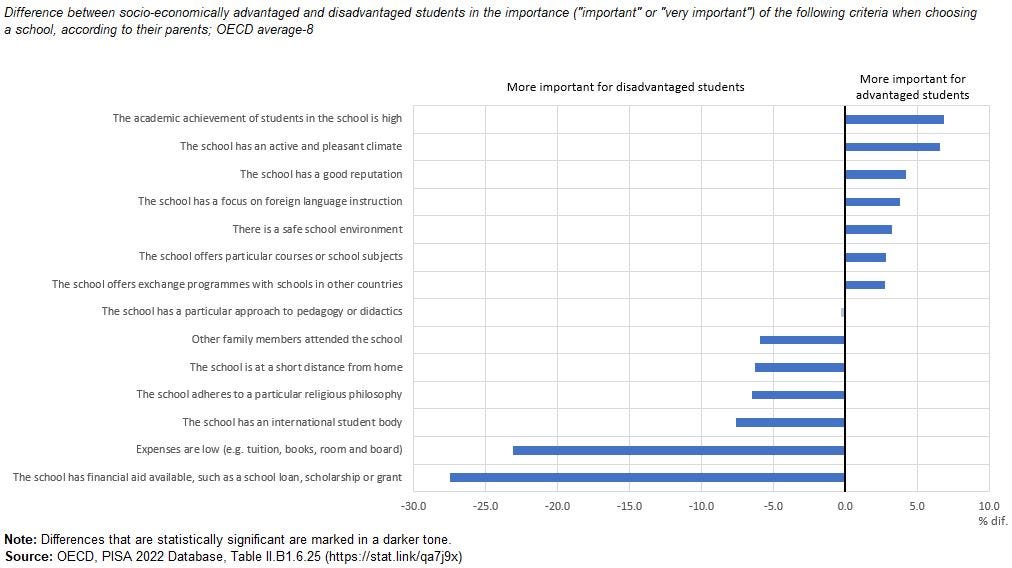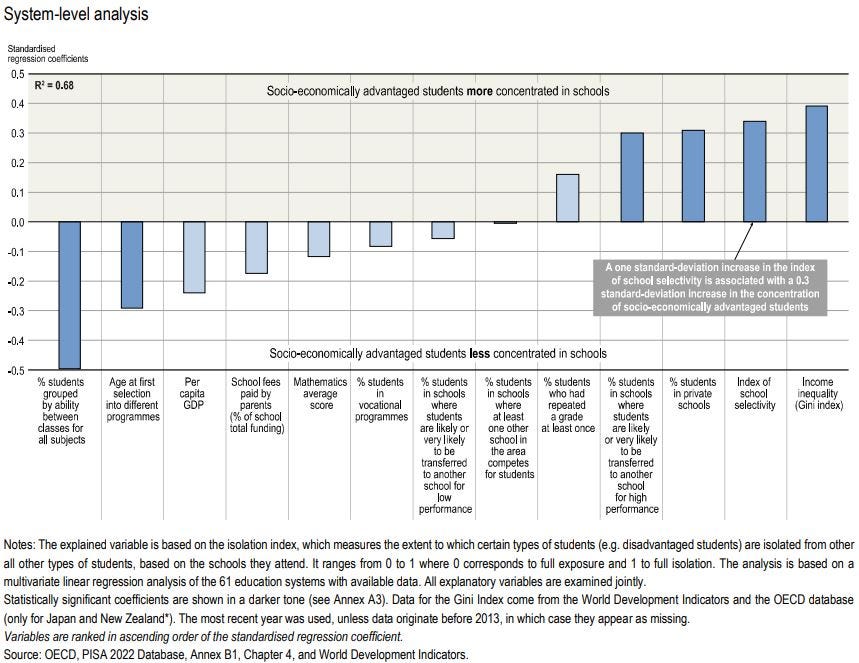An important issue linked to expanding school choice is how it can lead to students being grouped into schools based on their ability or socio-economic status. PISA results suggest that weakening the link between place of residence and school allocation is related to a higher level of school segregation by social status. If predominantly middle- or upper-class families take advantage of school-choice policies, it can lead to a situation where students are sorted into schools based on social factors. What matters are smart policies that maximise the benefits of choice while minimising the risks, and establishing a level playing field for all providers to contribute to the school system.
School choice
School choice aims to empower parents by providing a variety of options for their children’s education. It impacts both the quality and equity of education.

Key messages
Well-crafted school-choice policies can help school systems deliver education tailored to a diverse student population, while limiting the risk of social segregation. Adequate accountability and transparency requirements are also important to ensure that subsidised private schools serve the public interest in providing high-quality education, and to provide parents with the information they need to evaluate different schools’ processes and outcomes.
The fairness of an education system lies in the extent to which students, irrespective of their backgrounds, have an equal opportunity to reach their full potential. Education systems with more students in private schools and greater competition among schools enjoy similar levels of socio-economic fairness as education systems with fewer private school students and less school competition. In contrast, the extent to which the school admissions process is selective is negatively associated with socio-economic fairness in mathematics performance.
Context
Financial matters weigh heavier on disadvantaged families when choosing a school
Socio-economically disadvantaged families give more importance than advantaged families to financial considerations when choosing a school. In contrast, advantaged families cared relatively more about quality-related criteria, such as the reputation, climate and academic achievement.
Financial matters weigh heavier on disadvantaged families when choosing a school (2022)

Policies associated with the concentration of advantaged students in schools
Socio-economic segregation in schools is related to policies like early academic selection, ability grouping and selective admissions. Private school enrollment and academic transfer policies are related to the concentration of advantaged student in schools.
Policies associated with the concentration of advantaged students in schools (2022)

Related publications
-
 Policy paper12 October 2023
Policy paper12 October 2023
Programmes and projects
-
The OECD Indicators of Education Systems (INES) programme seeks to gauge the performance of national education systems through internationally comparable data.Learn more
-
PISA is the OECD's Programme for International Student Assessment. PISA measures 15-year-olds’ ability to use their reading, mathematics and science knowledge and skills to meet real-life challenges.Learn more
-
The OECD’s programme on education and skills policy support policymakers in their efforts to achieve high-quality lifelong learning, which in turn contributes to personal development, sustainable economic growth, and social cohesion.Learn more
-
Education for Inclusive Societies Project is designed to respond to the increasing diversity that characterises education systems, and seeks to help governments and relevant stakeholders achieve more equitable and inclusive education systems as a pillar to create more inclusive societies.Learn more
-
OECD Future of Education and Skills 2030 aims to build a common understanding of the knowledge, skills, attitudes and values students need in the 21st century.Learn more
-
Since 2013, the OECD has gathered evidence on how school resource policies work in different contexts. The focus is now on digital resources to enable countries to learn from each other in the digital transformation of their education.Learn more
-
TALIS - the Teaching and Learning International Survey - is the world's largest international survey about teachers and school leaders.Learn more





